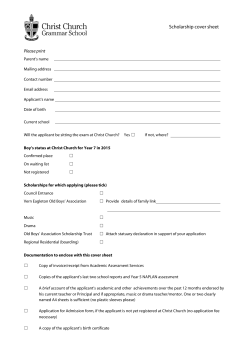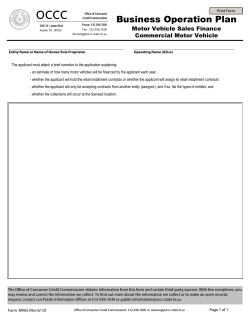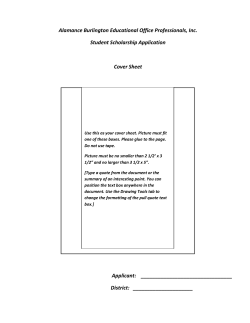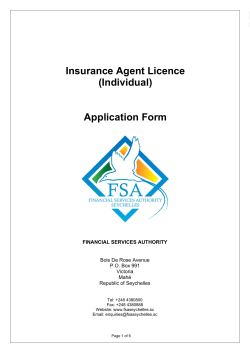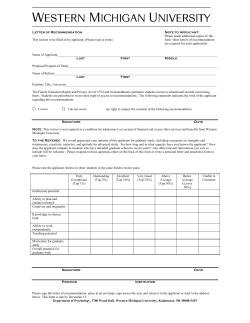
Reportable Case No: J 1327/2011 In the matter between:
REPUBLIC OF SOUTH AFRICA
THE LABOUR COURT OF SOUTH AFRICA, JOHANNESBURG
JUDGMENT
Reportable
Case No: J 1327/2011
In the matter between:
THE DEPARTMENT OF SOCIAL
DEVELOPMENT: GAUTENG
Applicant
and
SELAELO KENNETH EDWARD MATSHA
Heard:
10 July 2014
Delivered:
14 October 2014
Respondent
Summary:
________________________________________________________________
JUDGMENT
________________________________________________________________
LEPPAN AJ
Introduction
[1]
This is an application to rescind the order granted by this Court on 8 June
2012 ("the Court Order") which made the default arbitration award dated
29 November 2010 an order of court in terms of section 158 (1)(c) of the
Labour Relations Act 66 of 1995 ("the LRA").
2
[2]
The Applicant also seeks condonation for the late filing of its rescission
application.
Factual Background
[3]
The Respondents are currently in the employ of the Applicant as either
care workers or child care workers (the exact capacity in which they are
employed is in dispute).
[4]
The Respondents referred an unfair labour practice dispute to the Public
Health and Social Development Sectoral Bargaining Council ("Bargaining
Council"). The dispute was about the alleged demotion of the
Respondents from Senior auxiliary workers to care workers or child care
workers.
[5]
An arbitration award in favour of the Respondents was issued on 29
November 2010 ("the Award"). The award indicates that the matter was
heard in the absence of the Applicant on 30 April 2010.
[6]
The Applicant contends that it filed an application for the rescission of the
Award with the Bargaining Council ("the rescission application"). The
rescission application was filed with the Bargaining Council on 14
February 2011. However, there is no proof of service of the rescission
application on the Respondents at that time. The rescission application
was subsequently served on the Applicants on 13 September 2012. (i.e
after the award was made an order of this Court).
[7]
On 4 August 2011, the Respondent brought an application to the Labour
Court in terms of section 158(1)(c) of the LRA to have the award made an
order of Court. ("the section 158(1)(c) application").
[8]
Although the section 158(1)(c) application appears to have been served
on the Applicant on 03 November 2011, the Applicant averred that it was
unaware of this application. Whereafter, the Respondents' attorneys
dispatched a copy of the said application to the Applicant on 04 May 2012.
3
[9]
On 23 May 2012, the Applicant indicated to the Respondents' Attorneys
that it was investigating the matter and that it would advise the
Respondents on the way forward by 15 June 2012.
[10]
On 20 June 2012, the Applicant wrote to the Respondents' attorneys and
advised them that due to the seriousness of the matter it had referred the
matter to the State Attorney.
[11]
The Respondents' attorneys acknowledged the said letter on 21 June
2012 and informed the Applicant that it was awaiting a set down date for
the matter on the unopposed motion roll.
[12]
On 10 July 2012, the Applicant filed its notice to oppose the section
158(1)(c) application.
[13]
The Respondents' attorneys wrote to the Applicant on 24 July 2012 and
informed that the court order had already been granted on 08 June 2012.
Labour Court Rescission
[14]
On 17 September 2012, the Applicant filed its application to rescind the
Court Order ("the Labour Court Rescission Application").
[15]
The Labour Court Rescission application is in terms of Rule 16A(1)(a)
alternatively Rule 16A(1)(b) of the Labour Court Rules. For the reasons
set out herein below, it is not necessary to determine which of these
subsections is applicable at this stage of these proceedings.
[16]
The court order was granted on 08 June 2012. The Applicant became
aware of the court order on 23 July 2012.
[17]
The Applicant filed the Labour Court rescission application on 17
September 2012 some 39 days after it became aware of the Court Order.
The Applicant seeks condonation for the late filing of the Labour Court
rescission application.
Grounds for Rescission
[18]
The Applicant contends that it was misled by the Respondents' attorneys
concerning the status of the matter. In summary, the Applicant contends
4
that the Respondents or their attorneys should have disclosed that the
section 158(1)(c) application was set down on 08 June 2012 but failed to
do despite an exchange of correspondence between the parties during
June 2012. The high water mark of this deception is a letter from the
Respondents' attorneys dated 21 June 2012 in which they state that ‘we
are awaiting a date of hearing from the Labour Court on an unopposed
roll’. This was conveyed to the applicant under circumstances in which the
court order had already been granted on 08 June 2012.
[19]
As a result, the Applicant submits that the court order was erroneously
granted in the absence of the Applicant as contemplated in Rule 16A(1)
alternatively (2) of the Labour Court Rules in that there were material facts
which were not placed before this Court at the hearing of the section
158(a)(c) application.
[20]
These facts are:
20.1
the award was the subject of a rescission application in the
Bargaining Council which had not yet been determined to the
knowledge of the Respondents; and
20.2. the Respondents were aware that the Applicant was in the process
of instructing the State Attorney with regards to the way forward in
the section 158(1)(c) application.
[21]
The Applicant avers that had the Learned Judge been aware of these
facts, she may not have granted the court order. It is on this basis that the
Applicant now requests this Court to rescind the court order.
The Law on Rescission
[22]
In CAWU and Another v Federale Stene (1991) (Pty) Ltd,1 Pretorius AJ
held that where a defaulting party is genuinely unaware of the date of setdown, granting judgment by default is erroneous and, in these
circumstances, it is not necessary to prove good cause.
1
[1998] 4 BLLR 374 (LC) at para 6.
5
[23]
In Bayete Security Holdings v Mokgadi and Others,2 Lyster AJ held that
Rule 16A distinguishes between judgments erroneously granted in the
absence of a party (eg where notice was not given to a party) and
judgments granted in the absence of a party other than erroneously (eg
where notice had been properly given but the party was nevertheless
absent). In the first situation, there is no need to show good cause and no
time limit whereas, in the second situation, good cause must be shown
and the application must be brought within the prescribed time limit.
[24]
In Sizabantu Electrical Construction v Guma,3 Seady AJ spelt out the
requirements of good cause in the light of the similar provision in the
Uniform Rules of the High Court and applied them to an application in
terms of Rule 16A. She held that the applicant must give a reasonable
explanation for the default (which must not be wilful or due to gross
negligence) and must show that the application was bona fide and that
there was a reasonable defence to the claim. This meant that the applicant
had to make out a prima facie case for the relief sought.4
Analysis
[25]
The Applicant contends that there is a pending rescission application
before the Bargaining Council. The Respondents deny the existence of
that rescission application. The rescission application which is before the
Bargaining Council is attached to the Applicant's founding affidavit in the
Labour Court rescission application. It indicates that it was filed at the
Bargaining Council on 14 February 2011. However, this takes the matter
no further as there is no proof of service of the rescission application on
the Respondents.
[26]
In my opinion, the Labour Court rescission application cannot be decided
until there is clarity as to the status of the rescission application. If the
Bargaining Council granted the rescission application albeit erroneously in
the absence of the Respondents, the court order must be rescinded
2
[2000] 9 BLLR 1020 (LC) at 1025E-I.
[1999] 4 BLLR 387 (LC) at para 7 and 8.
4 Ibid. See also Erasmus Superior Court Practice Juta at B1–201, B1–202.
3
6
because the award has previously been rescinded by the Bargaining
Council.
[27]
Conversely, if the rescission application has been dismissed, there would
be no good reason to rescind the court order and therefore condonation
for the late filing of the Labour Court rescission application should not be
granted, alternatively, the Labour Court rescission application should be
dismissed.
[28]
None of these issues can be determined until there is certainty as to the
status of the rescission application that is pending at the Bargaining
Council.
Conclusion
[29]
Accordingly, I make the following order:
(a)
The Labour Court rescission application is postponed sine die;
(b)
The Applicant is to file a supplementary affidavit within fifteen (15)
days of delivery of this judgement explaining the status of the
rescission application;
(c)
The Respondents may file an answering affidavit to the
supplementary affidavit within ten (10) days of service of the
supplementary affidavit.
(d)
The costs are reserved.
_______________
Leppan, AJ
Acting Judge of the Labour Court of South Africa
7
APPEARANCES
For the Applicant:
Instructed by:
Sefalafala Inc. Attorneys
For the Respondents:
A.J Glendinning
Instructed by:
Otto Krause Inc. Attorneys
© Copyright 2025
